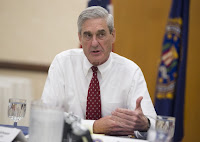When the first plane hit, on the pivotal day that would redefine the role of the organization he had just been appointed to lead, FBI Director Robert S. Mueller III’s thoughts turned to the weather.
“I remember . . . seeing the first plane go into the towers and thinking: ‘It’s a beautiful day. Somebody really must have gotten off course to have the plane go into the towers,’ ” he recalled this week.
Soon after, Mueller had a conversation with President George W. Bush, who said, “We cannot let this happen again.”
Having started as FBI director exactly a week before the attacks of Sept. 11, 2001, Mueller found himself charged with reshaping the FBI from a domestic crime-fighting force into a counterintelligence service with a key role in combating terrorism.
“I love prosecuting cases, and I love doing investigations, particularly homicide investigations and the like, and that’s why I became a prosecutor,” he said in a rare interview with journalists in his private dining room at FBI headquarters this week. “I did not expect to be spending my time preventing terrorist attacks.”
Now, after 12 years — his term extended with congressional approval beyond the normal 10-year maximum — Mueller, 69, is stepping down as America’s top law enforcement officer. His last day will be Sept. 4.
“I think it took me a while to fully understand that the training that I had had . . . with the FBI, [the Drug Enforcement Administration] and others, which was to investigate criminal acts after they’d occurred, was not going to be the paradigm for the future,” he said.
The bureau expanded significantly after Sept. 11, investing in its intelligence program and information technology and opening 18 overseas posts.
More than half of the FBI’s 36,000 employees have joined since 2001, and Mueller said many had signed up “expecting to protect the American public against terrorist attacks or cyberattacks.”
Mueller, a former Marine and Vietnam War veteran, works punishing hours and demands the same from his staff. He said there was a clear criterion on which to judge him.
“You have one metric, and that is preventing all attacks. . . . If there’s one attack, you are unsuccessful,” he said.
By that measure, the FBI’s record has been stained in recent years by April’s Boston Marathon bombing and by the deadly shooting rampage at Fort Hood, Tex., in 2009.
Asked what he would consider to be his least-proud moment, Mueller cited those two atrocities. “I hate to lose people, and I would say you feel most pain from what happened in some place like Fort Hood or what happened up in Boston,” he said.
Mueller quickly continued: “That’s not to say you could have prevented it, that’s speculation, but the fact of the matter is, you sit down with victims’ families, you see the pain they go through, and you always wonder if there’s something more you [could have done to] prevent that from happening.”
The FBI chief, who has received a leather-bound highly classified briefing package almost every day for more than a decade, described what he sees as the most significant threats to the United States. These include homegrown “lone wolf” terrorists, like the men accused of carrying out the Boston and Fort Hood attacks, who are radicalized and self-trained over the Internet and “are much more difficult for us to identify and disrupt before an attack can take place.”
Wasintonpost.
